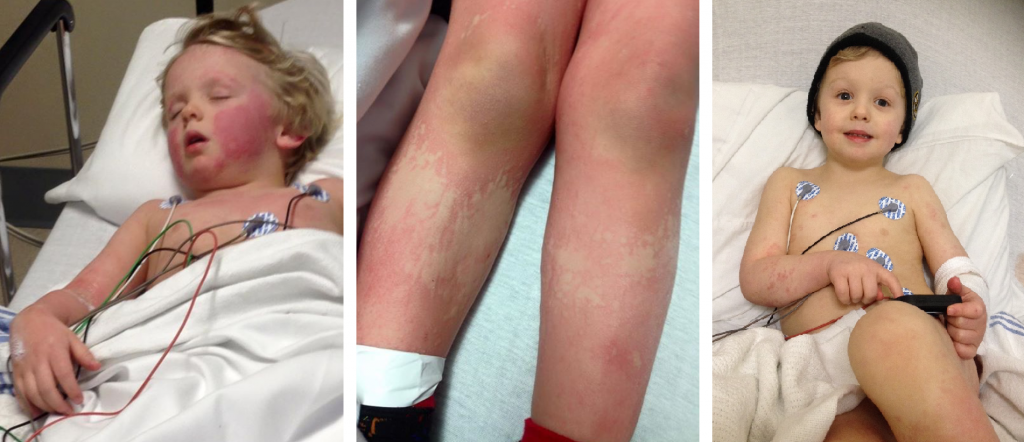Anaphylaxis anna-fih-LACK-sis is a serious allergic reaction that is rapid in onset and may cause death. Swelling caused by the allergic reaction can spread to the throat and lungs leading to allergic asthma or a serious condition known as anaphylaxis.

Severe Allergic Reaction At Playgroup Allergy Dad S Wake Up Call
Allergic reactions are exaggerated sensitivities hypersensitive reactions that occur when your immune system responds abnormally to common substances such as pollen dust and certain.

What is considered a severe allergic reaction. An adverse drug reaction can cause serious conditions such toxic epidermal necrolysis TEN and anaphylaxis. A severe allergic reaction is called anaphylactic shock. Are you having an Allergic Reaction.
The researchers observed that the people who developed anaphylaxis were on average 41 years old. Find out what to look for and what to do. A small rash at the injection site is not considered a severe allergic reaction.
Severe adverse reactions are rare. Severe allergy symptoms are more extreme. A feeling of impending doom If not treated immediately anaphylaxis can lead to shock coma asphyxiation heart or respiratory failure or death.
An allergic reaction becomes more serious and is considered a medical emergency when any of the signs or symptoms are particularly severe such as loss of consciousness or difficulty breathing. Most frequently severe allergic reactions occur due to reactions to food insect stings or medications immunologic causes but they can also occur due to non-immunologic causes. Anaphylaxis also known as anaphylactic shock is considered one of the most dangerous and life-threatening severe forms of allergic reactions.
Anaphylaxis causes your immune system to release a flood of chemicals that can cause you to go into shock your blood pressure drops suddenly and your airways narrow blocking breathing. Allergists recognize four types of allergic reactions. But sometimes a child can have whats known as anaphylaxis a severe allergic reaction that needs immediate medical.
Anaphylaxis is a severe potentially life-threatening allergic reaction. Local reactions eg redness are usually the least severe and most frequent. Anaphylaxis is a severe allergic reaction that occurs rapidly and causes a life-threatening response involving the whole body.
Strange changes could be a sign of a severe allergic reaction to a food or a drug. During anaphylaxis when the person is exposed to the allergen the immune system releases chemicals to fight off the allergen that can cause the body to go into shock and become hypersensitive. As an example an allergic reaction is considered severe when a person needs to be treated with epinephrine or EpiPen or if they must go to the hospital.
The CDC has learned of reports that some people have experienced severe allergic reactionsalso known as anaphylaxisafter getting a COVID-19 vaccine. What Are the Symptoms of Anaphylaxis. Type I or anaphylactic reactions type II or cytotoxic reactions type III or immunocomplex reactions and type IV or cell-mediated reactions.
Severe allergic reactions usually to foods insect stings and medications can cause the following symptoms. It can occur within seconds or minutes of exposure to something youre allergic to such as peanuts or bee stings. Symptoms usually involve more than one organ system part of the body such as the skin or mouth the lungs the heart and the gut.
Anaphylaxis is a severe allergic reaction that can be triggered by a vaccine as well as by food medication insect stings and latex. What is considered a severe allergic reaction. You may notice a sudden wheezing.
These symptoms can make your child feel bad but its not life-threatening. Anaphylaxis is a severe potentially life-threatening allergic reaction. Or you might just feel like you cant quite catch your breath.
Severe allergic reaction An allergy is an abnormal reaction to an allergen or trigger substance. Anaphylaxis a severe and sudden reaction that can include wheezing vomiting or hives occurred in 0025 of employees. That works out to 111 cases per 1 million doses.
Systemic reactions eg fever occur less frequently than local reactions and severe allergic reactions eg anaphylaxis are the least frequent reactions. There were seven cases from the Pfizer vaccine and nine cases from the Moderna vaccine. The reaction can start soon after you take the medicine or up to 2 weeks after you stop.
Soreness at the injection site is normal and should resolve within a. This reaction can lead to difficulty breathing and shock ultimately leading to death.